If you’re ever in grizzly bear country hunting, fishing, or just plain hiking, you might consider “packing,” which means carrying a handgun for protection. If you’re big game hunting with a firearm, you already have a gun at your disposal. Some firearm hunters carry a handgun as well for protection.
This article is not going to address the various calibers that are considered the “best” for the big bruins. You can argue that around the campfire and you’ll have opinions all over the board. I’ll be discussing the reasons why grizzlies charge as well as how to avoid the charge in the first place. I’ll write another blog about adequate handguns for grizzlies — what’s hot and what’s not.
You can argue that around the campfire and you’ll have opinions all over the board. I’ll be discussing the reasons why grizzlies charge as well as how to avoid the charge in the first place. I’ll write another blog about adequate handguns for grizzlies — what’s hot and what’s not.
But how about bear spray? Isn’t that considered to be an acceptable weapon during a grizzly bear charge? Absolutely, and it works in many cases. In others it doesn’t work. I’ll also explore that subject in another blog, since including it here would make this article far too long.
Allow me to mention my qualifications for writing this article. I live in prime grizzly country near Cody, Wyoming. Yellowstone Park is 35 miles away. Grizzlies are commonly seen all summer by local residents. I’ve seen three on my lawn over the years and fresh tracks in my driveway and around the house. Once a griz picked up a frozen doe that winter killed in the forest next to my house and carried it a hundred yards and ate it. I confirmed this by fresh tracks in the snow. This was an “early” bear that emerged from its winter den.
In my 38 years as a Wyoming resident I’ve followed up on bear maulings, some that were three miles from my house and some that occurred elsewhere in Wyoming, Montana, Idaho. Canada and Alaska. As Hunting Editor for Outdoor Life, I interviewed many survivors of those maulings who were present when the victim was severely mauled or killed. With that information I wrote feature articles for Outdoor Life. I learned much from interviewing these hunters. They were communicating the real deal from a first person account, and not hearsay.
Personally I was bluff charged by grizzlies (and black bears) and once had a brown bear chase me across an Alaskan River. Several of us flew in via a bush plane on floats. We moored the plane, waded the river and caught some salmon. When we grilled some for lunch along the shore the smoke wafted over thick alders. A brown bear suddenly appeared. Luckily we spotted it when it was a few hundred yards away on a gravel bar. It immediately charged in our direction. We scattered like quail and I decided to take refuge in the plane. I quickly waded across the river and noted with great despair that the grizzly was following. My waders felt like they were full of lead, but I managed to reach the plane, jerk the door open and jump in. The bear was a few feet away when the door slammed shut. I was packing — not a gun but a fly rod. In my fifty or so hunting and fishing trips to Alaska afterward I never made that mistake again.
The bear was a few feet away when the door slammed shut. I was packing — not a gun but a fly rod. In my fifty or so hunting and fishing trips to Alaska afterward I never made that mistake again.
There are several reasons why a grizzly will charge you.
1. A sow with cubs. Make no mistake. If a sow perceives you as a threat to her cubs, she’s coming. You can take that to the bank. There’s not much in nature as ferocious, brutal and savage as a mama griz. On rare occasions a sow may lead her cubs away from a possible encounter with you, but that’s the exception.
2. Protecting a food supply. If you accidentally stumble into a place where a grizzly is actively feeding on an animal carcass or it’s bedded near the carcass you can be in imminent danger. Many of the hunters I’ve interviewed have done just that. Consider the typical elk hunt where a hunter kills an elk just before legal shooting hours end. He dresses the animal in the waning light, quarters it, places the quarters and other cuts in caribou game bags and heads to camp in the dark, planning a return in the morning with buddies or pack animals to transport the meat out. During the night a griz roams downwind, smells the carcass, quickly heads for it and enjoys a feast. The bear, or bears now claim ownership of the meat. Woe be to anyone who ventures into the area. The results are not likely to be pretty.
3. You’ve startled the bear in its day bed. Often the bruin will run off but may decide to charge.
4. It sees you in its territory and charges to run you off. You’ll soon know if it’s a bluff charge or the real deal. Quite often, bears that have been captured and tagged, tattooed and measured by biologists develop a boldness around humans and some credible people believe they hold a grudge and become dangerous.
5. It sees you as an easy meal and wants to eat you.
6. Just because. We don’t know why they charged. I once interviewed legendary Fred Bear who has been called the “Father of Bowhunting.” When I asked him what he liked to hunt most, he said “the bear, because it’s so unpredictable.”
Okay, so let’s say a grizzly charges you. First off, you’ll never, ever outrun it. A griz can run up to 35 miles an hour. No human alive can get away once a bear has made you a target, and remember you’re most likely in rough terrain with plenty of obstacles, such as thick timber, underbrush, logs, and rocks. Trying to fight a griz is a bad idea. With its four inch claws and super powerful muscles it can remove your scalp and more with one swipe.
There was an incredible mauling incident last year close to where I live. Four young men, all on a wrestling team in a local college went for a hike to look for shed antlers. They split up in pairs. At one point, two men were suddenly charged by a grizzly bear that came out of nowhere. It knocked one of the men down and began mauling him. The other man literally jumped on the griz and tried to pull the bear off his buddy by pulling on its ears. The bear reacted by mauling him and injured both men. For some reason the bear left. Both victims were hospitalized and released.
A photographer friend was filming elk in Montana’s Glacier National Park when a grizzly suddenly appeared and made a full charge. My friend climbed a tree with the bear in hot pursuit. The grizzly got close enough to bite into his shoe in order to jerk him down out of the tree. The shoe came off and the grizzly slid down the tree, shearing all the branches off. It was unable to climb the tree again. We often hear that black bears climb well but grizzlies do not. That’s usually true, but a tree with plenty of branches will often allow the grizzly to use them to climb. Its long 3 to 4 inch claws are too long to gain purchase on the tree whereas a black bear has shorter claws allowing it to quickly scamper up a tree. My friend said that for some reason he wasn’t wearing boots on the day of the attack. Had he been doing so, the griz would have pulled him off the tree.
We also hear that playing dead is the best defense against a grizzly ( if you don’t have a gun or bear spray). It’s recommended that you lie with your belly on the ground and your backpack on top with your hands clasped around your neck. In a perfect world the grizzly will leave once it believes the threat from your presence is over. It might bite and claw you a bit and then leave or it might decide to kill you. It’s also said that a black bear, on the other hand, wants to kill you and you should fight back with everything you have, whether it’s a branch, a rock, whatever is handy. These are only recommendations based on many actual attacks. None of them are foolproof.
Most experts agree that making noise in prime grizzly country will alert bears to your presence so they aren’t surprised. That may include talking loudly, shouting, or even carrying a bell. Of course, that creates a dilemma if you’re hunting and trying to slip along silently.
If you’re in the woods and see a bear that doesn’t see you, stop immediately and try to move out of sight. Then slowly leave the area. Again, never try to run from a bear that’s chasing you. You won’t get very far.
I know many hunters that will not consider hunting in grizzly country. That’s a personal choice. Those that do hunt carry a firearm or bear spray for protection. More on that in another blog.
This article is not going to address the various calibers that are considered the “best” for the big bruins.
 You can argue that around the campfire and you’ll have opinions all over the board. I’ll be discussing the reasons why grizzlies charge as well as how to avoid the charge in the first place. I’ll write another blog about adequate handguns for grizzlies — what’s hot and what’s not.
You can argue that around the campfire and you’ll have opinions all over the board. I’ll be discussing the reasons why grizzlies charge as well as how to avoid the charge in the first place. I’ll write another blog about adequate handguns for grizzlies — what’s hot and what’s not.But how about bear spray? Isn’t that considered to be an acceptable weapon during a grizzly bear charge? Absolutely, and it works in many cases. In others it doesn’t work. I’ll also explore that subject in another blog, since including it here would make this article far too long.
Allow me to mention my qualifications for writing this article. I live in prime grizzly country near Cody, Wyoming. Yellowstone Park is 35 miles away. Grizzlies are commonly seen all summer by local residents. I’ve seen three on my lawn over the years and fresh tracks in my driveway and around the house. Once a griz picked up a frozen doe that winter killed in the forest next to my house and carried it a hundred yards and ate it. I confirmed this by fresh tracks in the snow. This was an “early” bear that emerged from its winter den.
In my 38 years as a Wyoming resident I’ve followed up on bear maulings, some that were three miles from my house and some that occurred elsewhere in Wyoming, Montana, Idaho. Canada and Alaska. As Hunting Editor for Outdoor Life, I interviewed many survivors of those maulings who were present when the victim was severely mauled or killed. With that information I wrote feature articles for Outdoor Life. I learned much from interviewing these hunters. They were communicating the real deal from a first person account, and not hearsay.
Personally I was bluff charged by grizzlies (and black bears) and once had a brown bear chase me across an Alaskan River. Several of us flew in via a bush plane on floats. We moored the plane, waded the river and caught some salmon. When we grilled some for lunch along the shore the smoke wafted over thick alders. A brown bear suddenly appeared. Luckily we spotted it when it was a few hundred yards away on a gravel bar. It immediately charged in our direction. We scattered like quail and I decided to take refuge in the plane. I quickly waded across the river and noted with great despair that the grizzly was following. My waders felt like they were full of lead, but I managed to reach the plane, jerk the door open and jump in.
 The bear was a few feet away when the door slammed shut. I was packing — not a gun but a fly rod. In my fifty or so hunting and fishing trips to Alaska afterward I never made that mistake again.
The bear was a few feet away when the door slammed shut. I was packing — not a gun but a fly rod. In my fifty or so hunting and fishing trips to Alaska afterward I never made that mistake again. There are several reasons why a grizzly will charge you.
1. A sow with cubs. Make no mistake. If a sow perceives you as a threat to her cubs, she’s coming. You can take that to the bank. There’s not much in nature as ferocious, brutal and savage as a mama griz. On rare occasions a sow may lead her cubs away from a possible encounter with you, but that’s the exception.
2. Protecting a food supply. If you accidentally stumble into a place where a grizzly is actively feeding on an animal carcass or it’s bedded near the carcass you can be in imminent danger. Many of the hunters I’ve interviewed have done just that. Consider the typical elk hunt where a hunter kills an elk just before legal shooting hours end. He dresses the animal in the waning light, quarters it, places the quarters and other cuts in caribou game bags and heads to camp in the dark, planning a return in the morning with buddies or pack animals to transport the meat out. During the night a griz roams downwind, smells the carcass, quickly heads for it and enjoys a feast. The bear, or bears now claim ownership of the meat. Woe be to anyone who ventures into the area. The results are not likely to be pretty.
3. You’ve startled the bear in its day bed. Often the bruin will run off but may decide to charge.
4. It sees you in its territory and charges to run you off. You’ll soon know if it’s a bluff charge or the real deal. Quite often, bears that have been captured and tagged, tattooed and measured by biologists develop a boldness around humans and some credible people believe they hold a grudge and become dangerous.
5. It sees you as an easy meal and wants to eat you.
6. Just because. We don’t know why they charged. I once interviewed legendary Fred Bear who has been called the “Father of Bowhunting.” When I asked him what he liked to hunt most, he said “the bear, because it’s so unpredictable.”
Okay, so let’s say a grizzly charges you. First off, you’ll never, ever outrun it. A griz can run up to 35 miles an hour. No human alive can get away once a bear has made you a target, and remember you’re most likely in rough terrain with plenty of obstacles, such as thick timber, underbrush, logs, and rocks. Trying to fight a griz is a bad idea. With its four inch claws and super powerful muscles it can remove your scalp and more with one swipe.
There was an incredible mauling incident last year close to where I live. Four young men, all on a wrestling team in a local college went for a hike to look for shed antlers. They split up in pairs. At one point, two men were suddenly charged by a grizzly bear that came out of nowhere. It knocked one of the men down and began mauling him. The other man literally jumped on the griz and tried to pull the bear off his buddy by pulling on its ears. The bear reacted by mauling him and injured both men. For some reason the bear left. Both victims were hospitalized and released.
A photographer friend was filming elk in Montana’s Glacier National Park when a grizzly suddenly appeared and made a full charge. My friend climbed a tree with the bear in hot pursuit. The grizzly got close enough to bite into his shoe in order to jerk him down out of the tree. The shoe came off and the grizzly slid down the tree, shearing all the branches off. It was unable to climb the tree again. We often hear that black bears climb well but grizzlies do not. That’s usually true, but a tree with plenty of branches will often allow the grizzly to use them to climb. Its long 3 to 4 inch claws are too long to gain purchase on the tree whereas a black bear has shorter claws allowing it to quickly scamper up a tree. My friend said that for some reason he wasn’t wearing boots on the day of the attack. Had he been doing so, the griz would have pulled him off the tree.
We also hear that playing dead is the best defense against a grizzly ( if you don’t have a gun or bear spray). It’s recommended that you lie with your belly on the ground and your backpack on top with your hands clasped around your neck. In a perfect world the grizzly will leave once it believes the threat from your presence is over. It might bite and claw you a bit and then leave or it might decide to kill you. It’s also said that a black bear, on the other hand, wants to kill you and you should fight back with everything you have, whether it’s a branch, a rock, whatever is handy. These are only recommendations based on many actual attacks. None of them are foolproof.
Most experts agree that making noise in prime grizzly country will alert bears to your presence so they aren’t surprised. That may include talking loudly, shouting, or even carrying a bell. Of course, that creates a dilemma if you’re hunting and trying to slip along silently.
If you’re in the woods and see a bear that doesn’t see you, stop immediately and try to move out of sight. Then slowly leave the area. Again, never try to run from a bear that’s chasing you. You won’t get very far.
I know many hunters that will not consider hunting in grizzly country. That’s a personal choice. Those that do hunt carry a firearm or bear spray for protection. More on that in another blog.

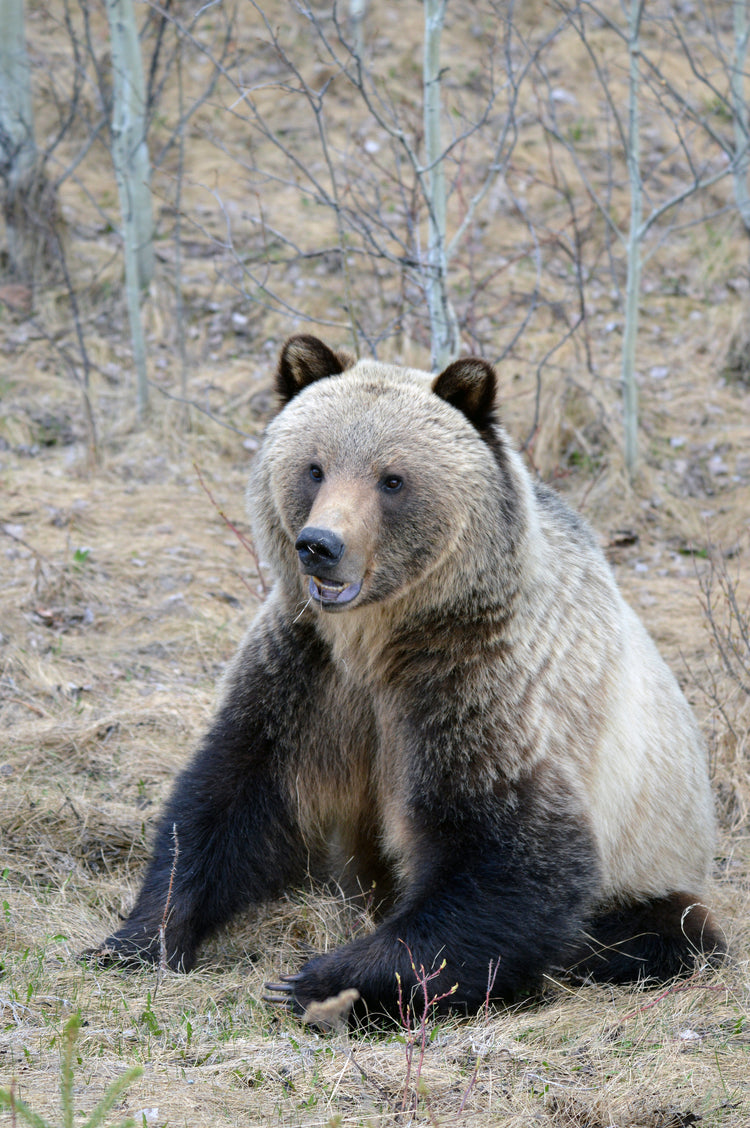
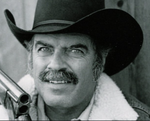





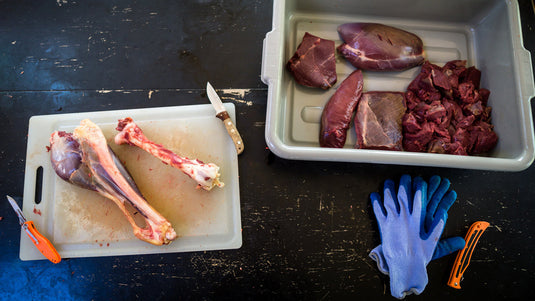
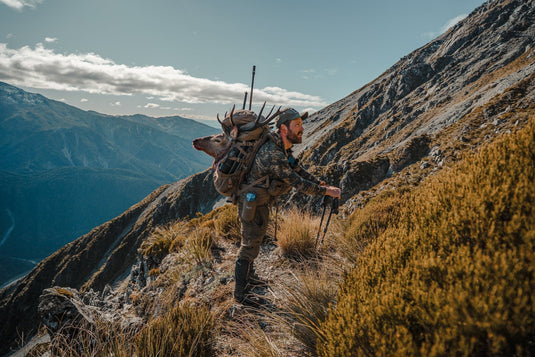
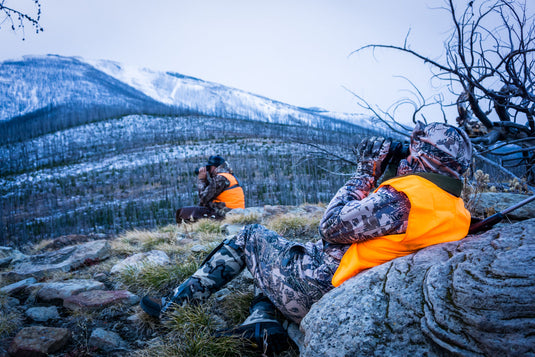
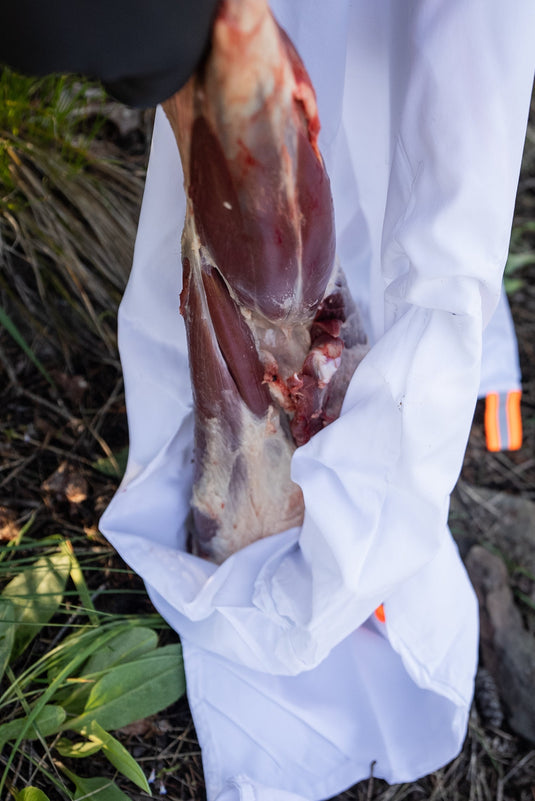
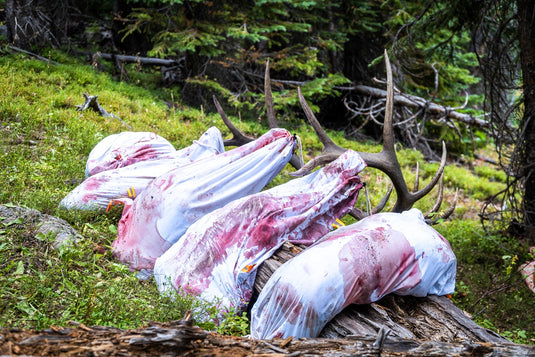
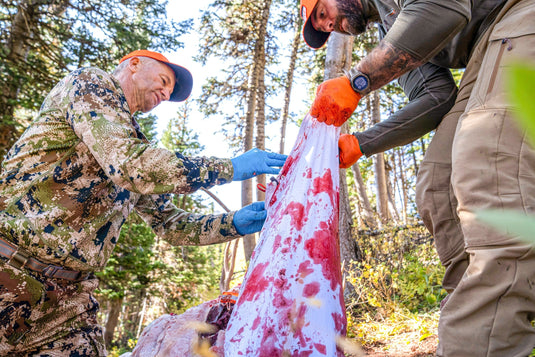
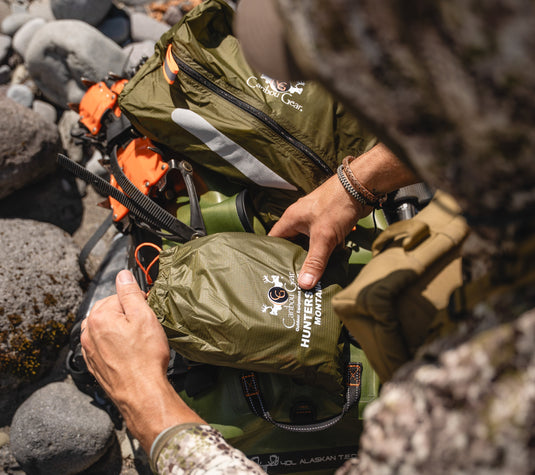
From experience:
Never sleep in a tent in same clothes that were worn when cooking or eating in.
2) every grizz has their own " personality"
3) be alert to shortage of berry/ food sources in area pre season scouting or during season
This is ignored.